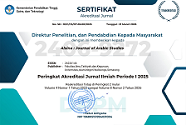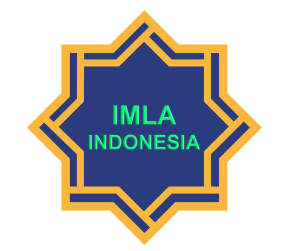Pendekatan Humanis Dalam Tes Pengajaran Bahasa Arab
DOI:
https://doi.org/10.21580/alsina.1.2.4419Keywords:
Bahasa Arab, pendekatan humanis, tes pengajaranAbstract
The purpose of this article is to discuss the humanism approach in Arabic teaching tests. This paper relies on bibliographic sources in the form of books and articles (literature study) that are in a scientific journal related to the subject matter. Reading the data of academics' thinking by using a constructive critical approach and meaningful content with content analysis. Based on studies that have been conducted, teaching tests in the humanist approach must be proportional in measuring each domain that exists in students (cognitive, affective, and psychomotor). The form of tests to measure the domain of cognition can be done by presenting objective tests and description tests. As for the affection domain measurement, it can be done by compiling a Likert scale and semantic different. Meanwhile, to measure the psychomotor domain test can be done in the form of task analysis.
Downloads
References
Ainin dkk. Evaluasi Dalam Pembelajaran Bahasa Arab. 2006. Malang: Misykat.
al-Fandi, Haryanto. Desain Pembelajaran Yang Demokratis dan Humanis .2011. Yogjakarta: Arruz Media,
Djiwandono, Soenardi. Tes Bahasa: Pegangan Bagi Pengajar Bahasa. 2011. Jakarta: Anggota IKAPI
Faisal, Sanapiah. Metodologi Penelitian Pendidikan. 1982. Surabaya: Usaha Nasional
Hamid, Abdul. Mengukur Kemampuan Bahasa Arab Untuk Studi Islam. 2010. Malang: UIN-Maliki Press
Hamid, Abdul. Mengukur Kemampuan Bahasa Arab Untuk Studi Islam. 2010. Malang: UIN Maliki-Press
Maksudin dan Qoim Nurani. Pengembangan Kurikulum Pembelajaran Bahasa Arab. 2018. Jogjakarta: Pas-casarjana FITK UIN Suka
Muhajir. Arah Baru Pengajaran Bahasa Arab “Filsafat Baha-sa, Metode dan Pengembangan Kurikulum”. 2017. Yogyakarta: FITK UIN Sunan Kalijaga.
Mujib, Fathul. Rekonstruksi Pendidikan Bahasa Arab “Dari Pendekatan Konvensional Ke Integratif Humans. 2010. Jogjakarta: Bintang Pustaka Abadi.
Munip, Abdul. Penilaian Pembelajaran Bahasa Arab. 2017. Yogyakarta: FITK UIN Sunan Kalijaga
Musfah, Jejen. Pendidikan Holistik “Landasan Lintas Per-spektif”. 2012. Jakarta: Kencana Prenada Media Group, 2012
Nurgiantoro, Burhan. Penilaian Pembelajaran Bahasa Ber-basis Kompetensi. 2013. Yogyakarta: Anggota IKAPI
Purwanto, Ngalim. Prinsip-prinsip dan Tekhnik Evaluasi Pengajaran. 1988. Bandung: Remadja Karya.
Rosyada, Dede. Paradigma Pendidikan Demokratis. 2007. Jakarta: Kencana Prenada Media
Sudijono, Anas. Pengantar Evaluasi Pendidikan. 2011. Jakar-ta: PT Raja Grafindo Persada
Sugiharto, Bambang. Humanisme dan Humaniora “Rele-vansinya dengan Pendidikan”. 2008. Jogjakarta: Jalasu-tra
Yusuf, Muri. Asesmen dan Evaluasi Pendidikan. 2015. Jakar-ta: Prenadamedia Group
Downloads
Published
How to Cite
Issue
Section
License
Copyright
The copyright of the received article shall be assigned to the publisher of the journal. The intended copyright includes the right to publish the article in various forms (including reprints). The journal maintains the publishing rights to published articles. Authors are allowed to use their articles for any legal purposes deemed necessary without written permission from the journal, but with an acknowledgment to this journal of initial publication.
Licensing
In order for Alsina: Journal of Arabic Studies to publish and distribute research articles, the editors need publishing rights (transferred from author to publisher). This agreement relates to the transfer/publishing copyright license to Alsina: Journal of Arabic Studies but the authors still have significant rights to use and share their published articles.
Alsina: Journal of Arabic Studies supports the need for writers to share, disseminate and maximize the impact of their research and their rights on any database. As a journal article writer, you have the right to various uses of your articles, including that by the institution or company where you work. Copyright can be used without the need for special permission. Authors who publish articles in the Alsina: Journal of Arabic Studies have broad rights to use their work for teaching and scientific purposes without requesting permission, including:
- Use by the author for lectures, presentations, or conferences, with distribution of copies to participants;
- Distribution to colleagues for research use;
- Use in compilations of the author's subsequent work;
- inclusion in a thesis or dissertation;
- Reuse of sections or excerpts from articles in other works (with full acknowledgment of the final article);
- Preparation of derivative works (other than commercial purposes) (with full acknowledgment of the final article);
- Voluntary posting on open websites operated by authors’ or writers' agencies for scientific purposes
When submitting a manuscript, authors do so on the understanding that if accepted for publication, the copyright for publishing (publishing right) of the article shall be assigned/transferred to Alsina: Journal of Arabic Studies.
Authors whose articles are accepted for publication will receive confirmation via email and sent a Copyright Transfer Agreement.


 Accreditation
Accreditation 
 In Collaboration with
In Collaboration with 

 Visitors
Visitors  Article Template
Article Template





